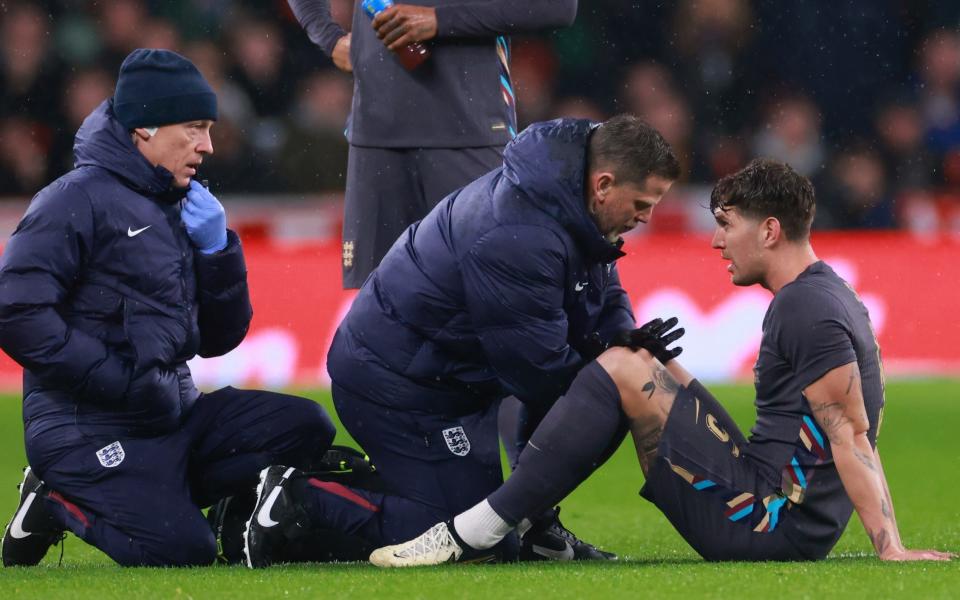England injury crisis leads Gareth Southgate to question 23-player Euro squad limit

Gareth Southgate is considering backing a call from other coaches to take an expanded 26-strong squad to Euro 2024 because of England’s injury crisis.
Uefa are holding a coaches’ meeting the week after next to discuss how the tournament works. A final decision will be taken on whether to reduce the number of players that can be selected from 26 to 23.
Until now Southgate has been in favour of the previously expected reduction – the increase for the last Euros and the World Cup in Qatar was due to Covid and the demanding schedule – but may now change his mind.
Other coaches are likely to raise the issue of maintaining a bigger squad and Southgate said although Uefa had appeared intent on 23-man squads, it faces a challenge.
“There is one more Uefa meeting where there’s been a little bit of talk amongst some of the coaches about possibly increasing that,” the England manager said. Asked specifically if he favoured it, he added: “Well, given where we are now!”
Southgate continued: “But we’ve got to make the best decisions with what we know and some of those currently are going to be medical decisions. And we’ve been able to get those right in the previous tournaments. We’ve been able to give people time, but with 23 that’s definitely more difficult.”
England have come out of the international break, and the friendly internationals against Brazil and Belgium, with no fewer than 15 players unavailable and with Southgate declaring it was the worst injury situation he has faced during his eight years in charge.

Most of those injuries will, clearly, not affect selection for the final squad but others may occur given how many matches there are still to play. There are long-term concerns – primarily to Luke Shaw and Marc Guehi – which puts their places under threat if Southgate can only select 23 players.
As with the last two tournaments, a squad of 26 allows more flexibility and some injury risks can be taken – such as with Harry Maguire before the last Euros, who was ruled out of the opening group games. The manager may also have to plan for more players, such as Ezri Konsa, who can play in multiple positions.
Southgate intends to choose a ‘training squad’ on May 21 but is unsure how many players he will pick for that. “That’s really going to depend on where some of the injuries are at and also how many players are in the European finals,” he said. “My preference is always that players have some clarity on what the role is when they come in.”
Instinctively he would not select an enlarged squad with stand-by players – not something he has done in the past because he knows it can be demoralising – but may now need to do so.
“It’s not always possible,” Southgate said. “So, I’m conscious of that. I’ll probably try to at least manage expectations in that period. But it’s going to be really hard to be really definitive on a 23.”

The time frame is evidently tricky for every nation who have qualified for this summer’s tournament, especially with the difficulties in fixture scheduling and the number of soft tissue injuries players are suffering, which has been raised by their unions.
After May 21, England have two final two warm-up games against Bosnia and Herzegovina in Newcastle on June 3 and then at Wembley on June 7 against Iceland – the day before the final 23 or 26-strong squad must be submitted to Uefa. England fly to Germany on June 10 before their opening group game against Serbia in Gelsenkirchen on June 16.
There are further complications with, potentially, either Manchester City or Arsenal in the Champions League final at Wembley on June 1; the Europa League Final in Dublin on May 22 which could involve Liverpool and West Ham United and the Europa Conference League final on May 29 which Aston Villa hope to reach. Plus, there is the ludicrous end-of-season tour match to Australia involving Tottenham and Newcastle United on May 22 – with Newcastle playing a second game two days later.
In theory that means more than half of Southgate’s potential squad could be involved in games significantly beyond the final round of Premier League matches on May 19.

There was relief Jude Bellingham’s injury-time equaliser against Belgium prevented England’s first back-to-back defeats at Wembley since 2013 and Southgate admitted, with the injury crisis, there was a moment over the weekend when he questioned the wisdom of playing two such strong opponents, with the loss to Brazil last Saturday, in these fixtures.
“We’re thinking ‘are we doing the right thing taking two big games?’” he added. “Because, you know, with what we had left it made it a lot more challenging, but we know so much more about the players for having done that and we either prepare properly for a tournament and give it everything you’ve got to take the best level of fixtures, or we play a weaker opponent and just try and muddle through it, a lower risk strategy maybe.
“But we felt ‘we don’t have the players for very long. And we need to push and we need to improve as a team and expose the areas that we are short in’.”
One of those areas is goalkeeper with Sam Johnstone, who would have been second-choice, ruled out having had surgery to repair an injured elbow. He will miss the rest of the season and the Euros.
With Nick Pope still recovering from a dislocated shoulder and Aaron Ramsdale understudy at Arsenal, England are struggling in this department. It opens up a chance for Dean Henderson, who will replace Johnstone at Crystal Palace, James Trafford – although he has lost his place at Burnley – or Rangers’ Jack Butland.

